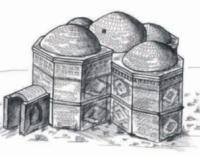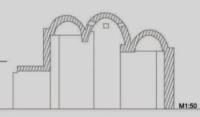Вы здесь
Mausoleum of Ayranbai.



Traveling in Ulytau mountains.
“An ancient burial site will always hold clues as to who the people were, and to who we are”
Anthony T. Hincks.
Architectural sights of Ulytau.
Airanbai Mausoleum (Beskumbez) of XIXth century is located at an altitude of 433 meters above sea level, is located 322 meters on right bank of Sary-Kengir River, 28 kilometers northeast of village of Malshybai, 58.8 kilometers northwest of village of Terekty, 24.7 kilometers northeast of village of Malshybai, 38.7 kilometers south and slightly east of village of Algabas (Betbulak), in Ulytau district of region of the same name.
The mausoleum was built in 1870. The author, builder and history of creation are unknown.
History of study of Airanbai Mausoleum.
In 1974, it was examined by the Central Kazakhstan Expedition of the Ministry of Culture of the Kazakh SSR (M.A. Mamanbaev, M.K. Sembin, M.S. Nurkabaev). In 1982, it was examined by an expedition of the Dzhezkazgan Museum of History and Local Lore of the Central Administrative District of the Kazakh SSR for the Protection of Historical and Cultural Monuments.
Description of Airanbai Mausoleum.
The necropolis consists of two main structures - the Airanbai Mausoleum and a portal-domed mazar and small destroyed saganatams made of adobe bricks and stone. The two main structures of the necropolis are of great value in studying the history of architecture in Kazakhstan in the XIXth century.
The five-domed Airynbai Mausoleum with a cross-shaped plan is built of heat-treated bricks facing the inner adobe insert. The facades are decorated with "diamonds" made of light and dark burnt bricks. Dimensions 9.75 x 8.25 meters, height 6.25 meters. One of the best five-domed mausoleums in Central Kazakhstan.
The mausoleum is cross-shaped with beveled corners. There is a small base in two rows of brickwork. The facades are decorated with figured diamond-shaped masonry, composed of light and dark fired bricks. The building is surrounded by a frieze with a simple ornament.
The main facade with a double row of frieze is raised 70 cm higher than the rest and forms a kind of portal. The structure is completed by a group of volumes of five domes, among which the central one is distinguished by its largest dimensions. The cornice is decorated with corrugated brick.
The entrance to the mausoleum is a narrow low corridor with two shallow niches on two outer sides, covered with wedge-shaped masonry. The structural transition to the circle of the dome is carried out by beveled corners of the building and four semicircular arches dividing the room into five parts.
The domes are laid out using the false vault method, faced with trapezoidal bricks on the outside. Curved bricks were used for decorating the cornices and the plane of the facades. The Ayranbay Mausoleum is a historical and architectural monument of national significance (Resolution of the Council of Ministers of the Kazakh SSR No. 133 of 17.02.1949).
In 1982, the Ayranbay Mausoleum was included in the list of historical and cultural monuments of the Kazakh SSR of national significance and taken under state protection. 4.3 kilometers to the south and a little to the west of the Ayranbay Mausoleum is the Ayranbay Cemetery (on the topographic maps of the General Staff of the USSR it is indicated as Ayrambay), which is confused with the location of the Ayranbay Mausoleum.
Geographic coordinates of Ayranbay Mausoleum: N48°32'00 E68°10'09
Authority:
M.K. Sembin, “Report on the work of the Central Kazakhstan expedition of the Ministry of Culture of Kaz. SSR ", archive NIPM" Kazrestavratsii ". "Materials of the expedition of the Dzhezkazgan Museum of History and Local Lore and the Central Organ of the Society for the Protection of Monuments of 1982", archive of the Dzhezkazgan Museum of History and Local Lore.
https://ulytaureserve.kz/744-ajranbaj.html
Photo and drawing:
Shashenov Darkhan Tastemiruly, Beisenov Arman Ziyadenuly. Archaeology.kz Airanbay (Beskүmbez) kesenesi.
old.archaeology.kz







